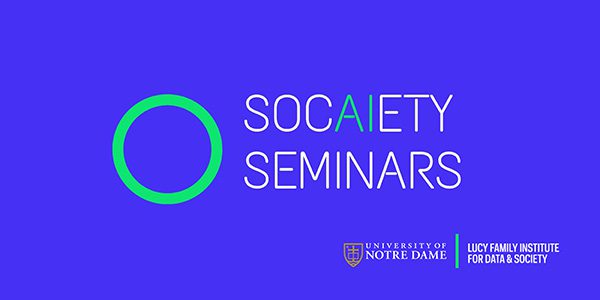London Book Club – London in Song: “Jerusalem”
Subscribe to the ThinkND podcast on Apple, Spotify, or Google.
Featured Speakers:
- Ian Newman, Professor in the English Department and Fellow of the Keough-Naughton Institute for Irish Studies and of the Nanovic Institute for European Studies, University of Notre Dame
- Rev. Jim Lies C.S.C., Senior Director for Academic Initiatives and Partnerships for the Notre Dame London Global Gateway, University of Notre Dame
For our third week of this series, we began once again with an introduction by Rev. Jim Lies, C.S.C., Senior Director for Academic Initiatives and Partnerships, Notre Dame London Global Gateway. After a brief thank you for our sponsors and behind-the-scenes team, Fr. Lies introduced our weekly speaker for this event, Ian Newman, an Assistant Professor in the University of Notre Dame’s English Department.
Newman kicked off the discussion with a short recap of last week’s materials before introducing the song for this week, Jerusalem. Over the years, this song has become the default national anthem of England. It is believed to have been written in the early 19th century by William Blake. It did not begin gaining much popularity until the early 20th century when Charles Hubert Parry took the prose written by Blake and set it to music. For those who did not get a chance to peruse the online materials, Newman quickly reviewed the topics covered. Blake was a London based poet, even though this particular song was written while he was outside of the city for a short time period. London heavily influenced his work, as did his contrarian style thinking which was very philosophical and focused on breaking out of social constraints. This song is particularly used during several social movements, including the Fight for Right and the Women’s Suffrage movement in England. It was then performed at the Royal Wedding of Prince William and Kate Middleton which was significant since Blake was against most of what the monarchy stood for. After playing this recording from the wedding, Newman handed the reins over to the guest speaker for this week, Jason Whittaker, the Head of the School of English and Journalism at the University of Lincoln.
Whittaker is a leading expert on William Blake and currently in the process of writing a book on Jerusalem. This book is focused on the history of Englishness through the lens of this song and has been influenced heavily by his struggles with his English identity growing up as a child of English and Irish parents. He gave a brief history of this song and Blake. This suggested that some of Blake’s anti-establishment sentiments were due to an incident in which he was arraigned for sedition, though he was tried and found not guilty. Blake intended this song to be a call for England to become better, contrary to the conservative and pro-England uses it was converted into later on. This transformation led to Jerusalem having a very contested atmosphere surrounding it, as its long standing radical tradition clashed with the uses the government put it to.
After these points were offered by Whittaker, Newman played a non-conservative recording of Jerusalem by The Fall before transitioning to the Question and Answer portion of the event. Here were the questions poised to both speakers by the audience and Fr. Lies:
Question 1: Even though London is mentioned specifically, what do you think the song tells us about the city and Blake’s attitude toward it?
Question 2: What do you think is gained or lost in setting this poetry to music by Parry? What kind of song do you think Blake imagined it as?
Question 3: Does the royal wedding performance say something about how his song has proceeded through time? Along with that, what might your favorite performance or genre of performance of this song be and why?
Question 4: Considering the lyrics of this song, what might the structure of this song, with two stanzas of questions followed by two stanzas of statements, say about the meaning of the song? Does it offer the audience a sense of wonder or doubt?
Finally, this week closed out with a thank you by Fr. Lies for all of our attendees who were then invited to join the post-event community circles for more discussion. They were also directed to the ThinkND website for the materials for our final week of this series.
- The combination of metaphor and materialism can be very powerful in songs, leading to a greater sense of understanding and philosophical inquiry (Ian Newman, 11:30)
- A song can be read very differently depending on the context into which it is placed (Ian Newman, 13:09)
- Sometimes, when you pay attention, a song may not mean what the public usually takes it to mean (Jason Whittaker, 24:50)
- Sometimes the most important aspects of a song are the things that are not said. (Jason Whittaker, 40:35)
- The musical composition of a song can sometimes tell you almost as much as the lyrics (Jason Whittaker, 44:03)
- There is an infinity to music that words just can’t quite capture. (Ian Newman, 49:53)
- Songs become vortexes of meaning that can be adapted to their circumstances. The author isn’t necessarily in control of the meaning of the lyrics. (Ian Newman, 53:51)
- “The forms of experience that you can have when you open your mind out beyond what he thought of as the five senses.” (Ian Newman 11:20)
- “I was clearly not Irish, I just didn’t have the voice, but also growing up where I didn’t go to school, I did feel slightly askance from a lot of the conventions, if you like, of englishness, and so, if anything, I saw myself as Catholic.” (Jason Whittaker, 21:15)
- I will not cease from mental fight nor shall my sword sleep in my hand til we have built Jerusalem in England’s green and pleasant land.” (Jason Whittaker, 29:12)
- “When the infinite speaks, when the gods speak, when eternity is speaking to you, they speak in song.” (Ian Newman 48:40)
- “It’s the voice of a prophet in the wilderness.” (Jason Whittaker, 56:20)
Related Content
Climate Change and The Limits of Narrative
Join the Kellogg Institute for the introductory session of a workshop refining Kellogg Faculty Fellow Roy Scranton’s draft book project “Ethical Pessimism: Climate Change and...
View EventReunion 2024
Alumni Education Programming Click each program title to learn more. ND Perspectives: Election 2024 and the Future of Democracy in the U.S. The 2024 presidential election looms...
Read ArticleA Brave New World of AI Governance
Explore the connection between data, geopolitics and governance, regulation, self-regulation while discovering examples of good and bad practices in various sectors, such as...
View Event


